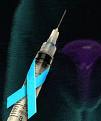Doctors: Gardasil cervical cancer vaccine is good for girls

Greensboro, NC
Questions remain about the long-term safety and effectiveness of a relatively new, widely used vaccine that could prevent most cervical cancers. But these questions aren’t stopping some local physicians from recommending the drug to patients as young as 9.
And they shouldn’t, says a Wake Forest University physician who led a committee that advises the U.S. Centers for Disease Control and Prevention on vaccinations.
The drug, Merck & Co.’s Gardasil, was approved by the U.S. Food and Drug Administration two years ago. It targets two strains of the human papilloma virus that are believed to cause about 70 percent of cervical cancers.
It also targets two other versions of the virus that cause genital and anal warts. These seldom advance to cancer but can be painful.
Cervical cancer is not common in the U.S. compared with other cancers. In 2004, the most recent year for which statistics are available from the CDC, 3,850 women died from the disease. That same year, almost 12,000 women learned they had it.
The main reason it is not more common is the widespread use of Pap smears, tests that can detect abnormal cells in the cervix well before they develop into cancer.
But worldwide, cervical cancer is the second-leading cause of cancer death in women, primarily because Pap smears aren’t as common in many countries.
Some 500,000 new cases are reported yearly, and 274,000 women die of the disease, almost all in developing countries.
Because Gardasil prevents only about 70 percent of cervical cancers, women still must get regular Pap smears.
But that doesn’t mean the vaccine isn’t valuable, says Dr. Wes Davis of Wendover OB-GYN and Infertility in Greensboro.
“The main thing to understand is it potentially prevents what can be a life-threatening disease,” Davis says “It’s promising to be very beneficial to the patient.”
Gardasil has been approved for use in girls and women between the ages of 9 and 26, but it is considered most effective in younger girls.
Dr. Kathleen Lucas, a Greensboro pediatrician, says she recommends Gardasil particularly for girls ages 12 to 13, because research has found that group developed the best antibody response to the virus after receiving the vaccine.
There are insufficient data to gauge the vaccine’s long-term effectiveness and safety, but Lucas says that was the case with many vaccines now in common use.
Dr. Jon Abramson led the CDC advisory committee that recommended the vaccine for all girls once they reach the age of 11 or 12.
Abramson, chairman of the department of pediatrics at Wake Forest’s medical school and physician-in-chief at Brenner Children’s Hospital, said the overall effectiveness of the vaccine could be affected by whether girls or women have been sexually active, because the vaccine does not protect people who already are infected.
The older a girl or woman, the more likely she has been sexually active.
Abramson says the likelihood of any long-term safety problems is low because the drug is a viruslike particle, not a live or dead virus as some vaccines are.
He conceded that patients might well need a booster of Gardasil in the future. But the committee did not want to wait 10 or 20 years to gauge long-term effectiveness when the drug could begin preventing cervical cancer in many women immediately.
The need for future boosters would make Gardasil no different from tetanus vaccine, for which patients must receive a booster about every 10 years, Lucas said.
Several questions also have arisen about the cost-effectiveness of Gardasil, in its own right — at $360 and up for a three-injection series, it is the country’s most expensive vaccine — and compared with other uses for health care dollars.
For one thing, although human papilloma virus is the most common sexually transmitted infection in the U.S., relatively few people who get it go on to get cervical cancer.
For another, some states might follow Virginia’s lead and make the vaccine mandatory for students. The New England Journal of Medicine recently devoted an article and an editorial to the cost-effectiveness of widespread vaccination.
Abramson said the drug is cost-effective under the benchmarks commonly used in assessing preventive measures. If people have to have booster shots in the future, that calculation could change.
Labels: Cervical Cancer Prevention, Cervical Cancer Vaccine, HPV Vaccine

0 Comments:
Post a Comment
<< Home